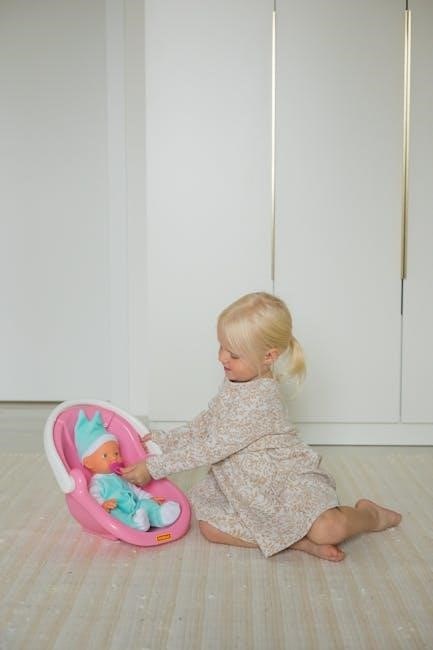
Family roles are defined as patterns of behavior assigned to members, shaping interactions and maintaining systemic harmony․ They can be positive or negative, influencing emotional and relational dynamics within the family structure, often subconsciously․ Understanding these roles is key to addressing personal and familial well-being, as they significantly impact individual behavior and family cohesion;
1․1 Definition and Importance of Family Roles
Family roles are defined as patterns of behavior assigned to members, shaping interactions and maintaining systemic balance․ They are crucial for understanding individual behavior and relational dynamics․ In functional families, roles are interdependent, fostering harmony, while in dysfunctional systems, they can trap members in limiting behaviors․ Recognizing these roles is essential for addressing mental health, personal growth, and family cohesion, as they profoundly influence emotional well-being and development․
1․2 Evolution of Family Roles Over Time
Family roles have evolved significantly over time, influenced by societal changes and shifting norms․ Traditionally, roles were rigid, with clear divisions based on gender and hierarchy․ Modern families often embrace flexibility, with shared responsibilities and interchangeable roles․ Cultural and economic factors have also reshaped these dynamics, leading to more equitable distributions of duties․ This evolution reflects broader societal shifts, emphasizing collaboration and adaptability in contemporary family structures․
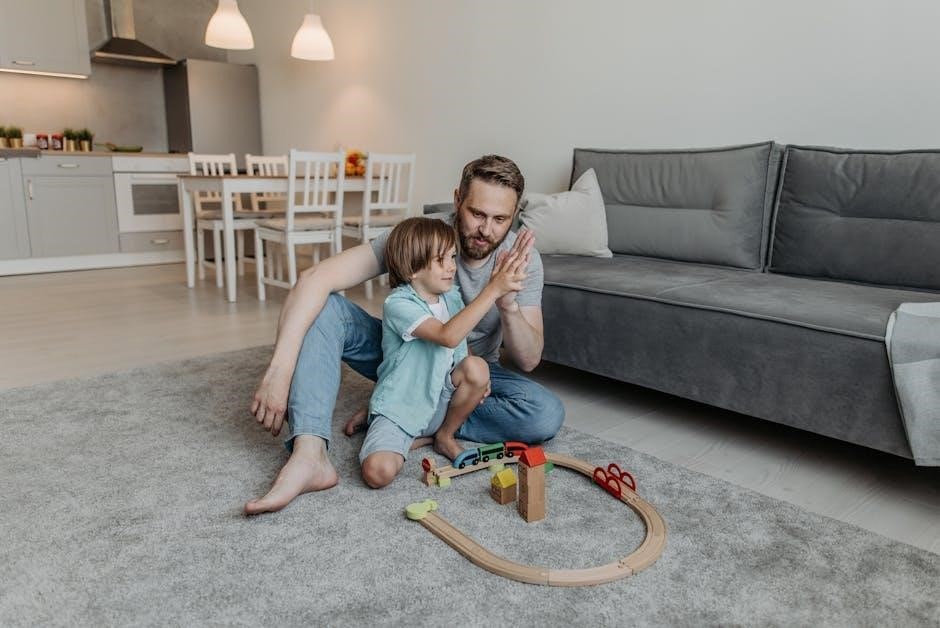
Common Family Roles
Common family roles are patterns of behavior individuals adopt, shaping family dynamics․ These roles often include the hero, scapegoat, lost child, mascot, caretaker, and mastermind, balancing structure and growth․
2․1 The Hero Role
The Hero Role is often assumed by the oldest child, tasked with achieving success and maintaining family pride․ This role involves setting high standards, being responsible, and sometimes fixing family issues․ The Hero often becomes an achiever, balancing family expectations with personal goals․ While admired, this role can create pressure and emotional strain, as the Hero may suppress their own needs to fulfill others’ expectations, leading to hidden burdens and stress․
2․2 The Scapegoat Role
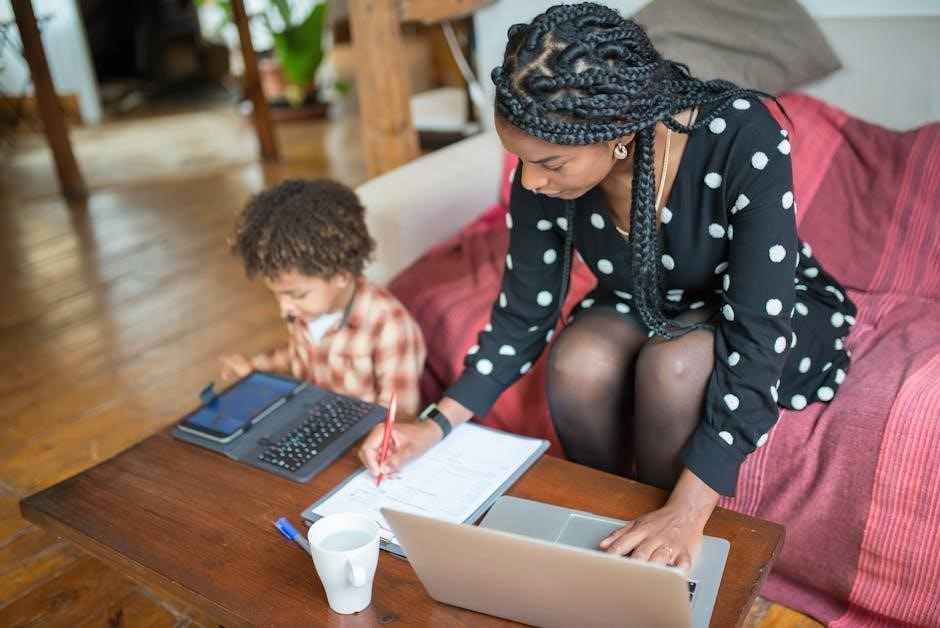
The Scapegoat Role often falls on a family member who is blamed for the family’s problems, diverting attention from real issues․ This role can manifest through rebellious behavior or becoming the target of criticism․ The Scapegoat may feel isolated and misunderstood, yet they inadvertently unite the family by providing a common focus․ Over time, this role can lead to low self-esteem and resentment, making it challenging for the individual to break free from the assigned narrative and seek personal growth․
2․3 The Lost Child Role
The Lost Child Role is often assigned to a family member who remains neutral and avoids conflict, seeking to maintain peace by becoming emotionally distant․ This individual may withdraw from family dynamics, engaging in passive or isolating behaviors․ The Lost Child often struggles with self-expression and intimacy, as their role focuses on avoiding confrontation rather than addressing issues․ This detachment can lead to feelings of invisibility and hinder personal growth, as the individual may feel disconnected from both the family and themselves․
2․4 The Mascot Role
The Mascot Role is typically taken by a family member who uses humor or charm to lighten the mood and divert attention from underlying issues․ This individual often feels responsible for keeping the family’s spirits high, even in dysfunctional settings․ While this role may provide temporary relief, it can prevent the family from addressing real problems and limit the Mascot’s personal development, as their focus remains on others’ emotions rather than their own needs and growth․
2․5 The Caretaker Role
The Caretaker Role involves a family member who assumes responsibility for the emotional and physical needs of others, often neglecting their own․ This role is common in dysfunctional families, where one individual may take on the burden of caregiving to maintain stability․ While this role can provide a sense of purpose, it may lead to emotional exhaustion and hinder personal growth, as the caretaker’s needs remain unaddressed, perpetuating an imbalance in the family dynamic․
2․6 The Mastermind Role
The Mastermind Role often involves a family member who manipulates situations to maintain control or achieve desired outcomes․ This role is characterized by strategic thinking and indirect influence, sometimes through guilt or passive-aggressive behaviors․ The mastermind may appear calm but operates with hidden agendas, impacting family dynamics by creating a subtle yet powerful hierarchy․ This role can foster resentment among others, as decisions are made without open communication, leading to a lack of transparency and trust within the family system․
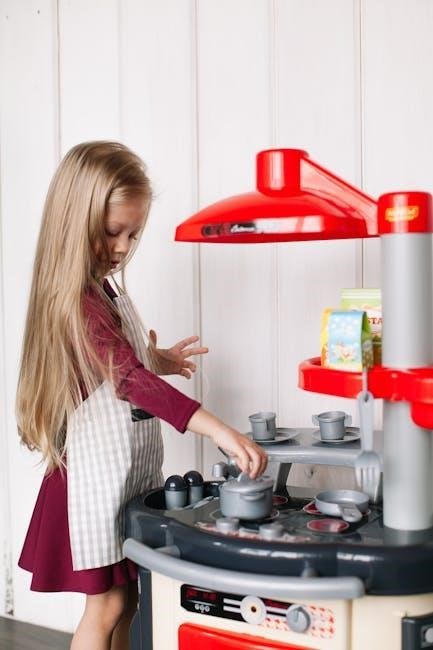
Family Roles in Functional vs․ Dysfunctional Families
Family roles in functional families foster balance and support, while in dysfunctional families, roles often become rigid and contribute to conflict, hindering healthy communication and growth․
3․1 Roles in Functional Families
In functional families, roles are flexible and interdependent, allowing members to grow and develop․ Open communication and mutual respect define interactions, with roles adapting to meet changing needs; Balanced responsibilities ensure no single member bears excessive burden, fostering a supportive environment where individuals thrive collectively․ Healthy boundaries and shared goals promote harmony, enabling each person to contribute meaningfully while maintaining personal autonomy and emotional well-being․
3․2 Roles in Dysfunctional Families
In dysfunctional families, roles are rigid and inflexible, often preventing individual growth․ These roles maintain a semblance of balance but lead to personal and relational stress․ Common roles like the Hero, Scapegoat, Lost Child, Mascot, Caretaker, and Mastermind emerge, perpetuating the family system․ They are not designed to foster healthy development but to preserve the dysfunctional dynamics, often at the expense of emotional well-being․ This rigidity can hinder personal autonomy and contribute to ongoing family conflicts and emotional distress․

Impact of Family Roles on Personal Development
Family roles significantly influence personal growth, emotional well-being, and self-perception․ They shape identity, behavior, and relationships, fostering resilience or perpetuating limitations depending on their adaptability and healthiness․
4․1 Positive Aspects of Family Roles
Family roles can foster resilience, self-esteem, and emotional intelligence․ The Hero role, for instance, encourages achievement and responsibility, while the Caretaker nurtures empathy and support․ These roles provide structure and a sense of belonging, allowing individuals to develop life skills and contribute meaningfully to family harmony․ Healthy roles promote personal growth, enabling individuals to thrive and adapt positively in their environments, fostering a balanced and supportive family dynamic․
4․2 Negative Aspects of Family Roles
Negative family roles can lead to emotional suppression and unhealthy coping mechanisms․ The Scapegoat may feel isolated and develop low self-worth, while the Lost Child might struggle with identity and connection․ Rigid roles can limit personal growth, fostering dependency or resentment․ Dysfunctional roles often perpetuate cycles of conflict and pain, hindering individuals from expressing their true selves and achieving emotional freedom, thus affecting their overall well-being and relationships outside the family structure․
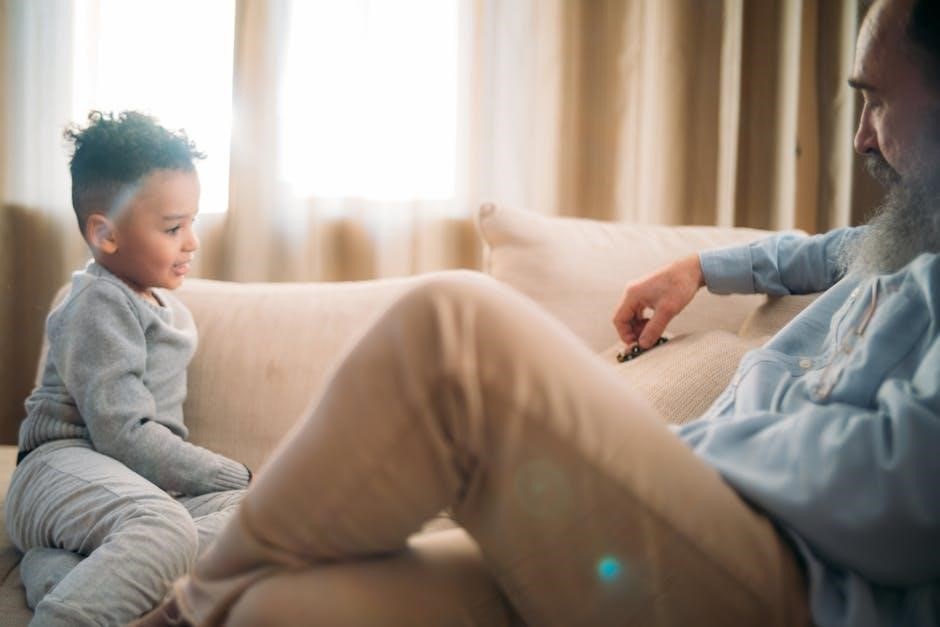
Cultural and Societal Influences on Family Roles
Cultural norms shape family roles, often assigning gender-specific responsibilities․ Societal expectations influence role dynamics, with regional variations impacting how roles are perceived and performed within families globally․
5․1 Traditional vs․ Modern Family Roles
Traditional family roles often emphasize gender-specific responsibilities, with men as providers and women as caregivers․ In contrast, modern roles are more fluid, with shared responsibilities and greater flexibility․ Cultural shifts, such as increased female workforce participation, have influenced this evolution․ Traditional roles may prioritize hierarchy, while modern families lean toward equality and collaboration․ This shift reflects changing societal values, enabling individuals to embrace roles that align with personal preferences rather than rigid expectations, fostering more balanced and adaptive family dynamics․
5․2 Gender Roles in Families
Gender roles in families are often shaped by societal expectations, assigning different responsibilities to males and females․ Traditionally, men are seen as providers, while women manage domestic duties․ However, modern perspectives advocate for equality, encouraging shared responsibilities and challenging stereotypes․ Families increasingly recognize the importance of flexibility, allowing individuals to embrace roles that reflect their personal strengths rather than gender․ This shift promotes inclusivity and reduces pressure, fostering healthier family dynamics and personal growth for all members, regardless of gender․
Overcoming Family Roles for Personal Growth
Overcoming family roles involves self-awareness and taking responsibility for personal development․ Recognizing rigid patterns allows individuals to challenge assumptions and embrace authenticity, fostering emotional freedom and growth․
6․1 Recognizing Your Family Role
Recognizing your family role requires self-reflection and understanding of the patterns you’ve adopted․ Often, these roles are subconscious, shaped by family dynamics and expectations․ The Hero, for instance, may strive for perfection, while the Scapegoat bears blame․ Acknowledging these roles is the first step toward freedom․ It involves observing your behaviors, emotions, and thoughts to identify how they align with or contradict your authentic self․ This awareness is crucial for personal growth and breaking free from limiting patterns․
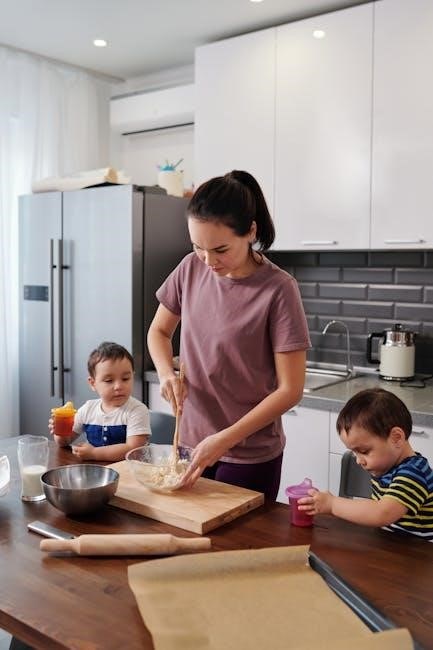
6․2 Breaking Free from Limiting Roles
Breaking free from limiting family roles involves self-awareness, boundary-setting, and embracing authenticity․ It requires recognizing how these roles constrain personal growth and relationships․ Challenging deeply ingrained patterns can be difficult but is essential for liberation․ Seeking support from therapy, support groups, or trusted individuals can facilitate this process․ Embracing flexibility and redefine your role within the family system fosters healthier dynamics and allows for genuine expression of your true self․
The Future of Family Roles
The future of family roles is evolving towards more flexible and balanced structures․ With a growing emphasis on gender equality and adaptability, roles are becoming less rigid, allowing individuals to thrive in diverse family settings and societal expectations․
7․1 Evolving Family Structures
Family structures are becoming increasingly diverse, moving away from traditional nuclear models․ Modern families include single-parent households, blended families, and same-sex parents, reflecting societal changes․ Gender roles are blurring, with men taking on caregiving roles and women pursuing careers․ These shifts are influenced by cultural, economic, and technological advancements, allowing for more adaptable and inclusive family dynamics․ This evolution challenges outdated norms, fostering environments where individuals can thrive beyond conventional expectations, ultimately redefining family roles for future generations․
7․2 Redefining Roles in Modern Families
Modern families are redefining traditional roles, emphasizing flexibility and shared responsibilities․ Gendered expectations are fading, with men and women increasingly sharing caregiving and financial duties; This shift fosters equality and adaptability, allowing individuals to thrive beyond rigid assignments․ Technology and societal changes further enable role evolution, creating balanced and inclusive environments․ Redefining roles promotes personal growth, strengthens family bonds, and aligns with contemporary values, reflecting a broader cultural shift toward equity and collaboration in family dynamics․